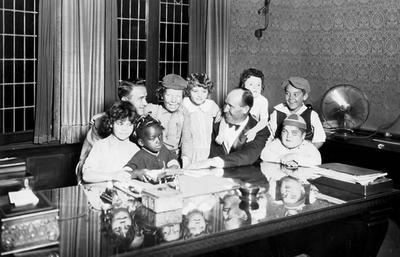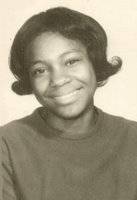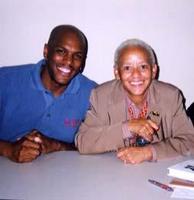|
Unpacking BaggageJust going through my luggage, clearing out some things to make way for enlightenment Tuesday, October 04, 2005The Our Gang Comedies It's probably so wrong of me, but I'm beginning to liken the Bush administration to Hal Roach's merry band of misfits known as Our Gang (aka The Little Rascals). I just see Condoleeza as Purina, Stymie and Buckwheat all merged together into one poorly coifed pickaninny. For those, perhaps too young to remember them, Wikipedia provides this brief overview. It's probably so wrong of me, but I'm beginning to liken the Bush administration to Hal Roach's merry band of misfits known as Our Gang (aka The Little Rascals). I just see Condoleeza as Purina, Stymie and Buckwheat all merged together into one poorly coifed pickaninny. For those, perhaps too young to remember them, Wikipedia provides this brief overview.Our Gang, also known as The Little Rascals or Hal Roach's Rascals, was a long-lived series of US comedy short films about a troupe of poor neighborhood children and the adventures they had together. Created by comedy producer Hal Roach, Our Gang was produced at the Roach studio starting in 1922 as a silent short subject series. Roach changed distributors from Pathé to Metro-Goldwyn-Mayer (MGM) in 1927, went to sound in 1929, and continued production until 1938, when he sold the series to MGM. MGM continued producing the comedies until 1944. A total of 220 shorts and one feature film, General Spanky, were eventually produced, featuring over forty-one child actors. In the mid-1950s, the 80 Roach-produced shorts with sound were syndicated for television under the title The Little Rascals, as MGM retained the rights to the Our Gang trademark. The series, one of the best-known and most successful in cinema history, is noted for showing children behaving in a relatively natural way. While child actors are often groomed to imitate adult acting styles, stealThe following New York Times editorial, along with so many other things, has furthered my belief that we have the rascals reborn. September 25, 2005 Hard Bigotry of No Expectations Throughout his campaigns in 2000 and 2004, George W. Bush talked about "the soft bigotry of low expectations": the mind-set that tolerates poor school performance and dead-end careers for minority students on the presumption that they are incapable of doing better. Secretary of State Condoleezza Rice said recently that this phrase attracted her to Mr. Bush more than anything else. It was, indeed, a brilliant encapsulation of so much of what is wrong with American education. But while Mr. Bush has been worrying about low expectations in schools, he's been ratcheting the bar downward himself on almost everything else. The president's recent schedule of nonstop disaster-scene photo-ops is reminiscent of the principal of a failing school who believes he's doing a great job because he makes it a point to drop in on every class play and teacher retirement party. And if there ever was an exhibit of the misguided conviction that for some people very little is good enough, it's the current administration spin that the proposed Iraqi constitution is fine because the founding fathers didn't give women equal rights either. The lack of expectations is evident even in areas where the president is supposed to be deeply engaged. The Treasury Department's hollowed-out leadership structure suggests an administration that is happy to coast along with a gentleman's C for handling the nation's finances. But it has been most graphically, and tragically, on display in Iraq and in the response to Hurricane Katrina. Four years after 9/11, Katrina showed the world that performance standards for the Department of Homeland Security were so low that it was not required to create real plans to respond to real disasters. Only a president with no expectation that the federal government should step up after a crisis could have stripped the Federal Emergency Management Agency bare, appointed as its director a political crony who could not even adequately represent the breeders of Arabian horses, and announced that the director was doing a splendid job while bodies floated in the floodwaters. Only a president who does not expect the government to help provide decent housing for the truly needy in normal times could leave seven of the top jobs at the Department of Housing and Urban Development vacant and then, after disaster struck, offer small-bore solutions to enormous problems. Substandard wages, an easing of affirmative action regulation and a housing lottery that will help a tiny sliver of people apparently are considered good enough for poor families along the Gulf Coast left homeless by Katrina. In Iraq, the elimination of expectations is on display in the disastrous political process. Among other things, the constitution drafted under American supervision does not provide for the rights of women and minorities and enshrines one religion as the fundamental source of law. Administration officials excuse this poor excuse for a constitution by saying it also refers to democratic values. But it makes them secondary to Islamic law and never actually defines them. Our founding fathers had higher expectations: they made the split of church and state fundamental, and spelled out what they meant by democracy and the rule of law. It's true that the United States Constitution once allowed slavery, denied women the right to vote and granted property rights only to white men. But it's offensive for the administration to use that as an excuse for the failings of the Iraqi constitution. The bar on democracy has been raised since 1787. We don't agree that the 218-year-old standard is good enough for Iraq. Since his failure to notice the Katrina disaster, Mr. Bush has stopped bragging that he doesn't read or watch the news. If he's paying attention now, he should get a message from the outrage over Katrina and shrinking support for his policies in Iraq: The American public has much higher expectations than he does for the president and his government. |
|


























































